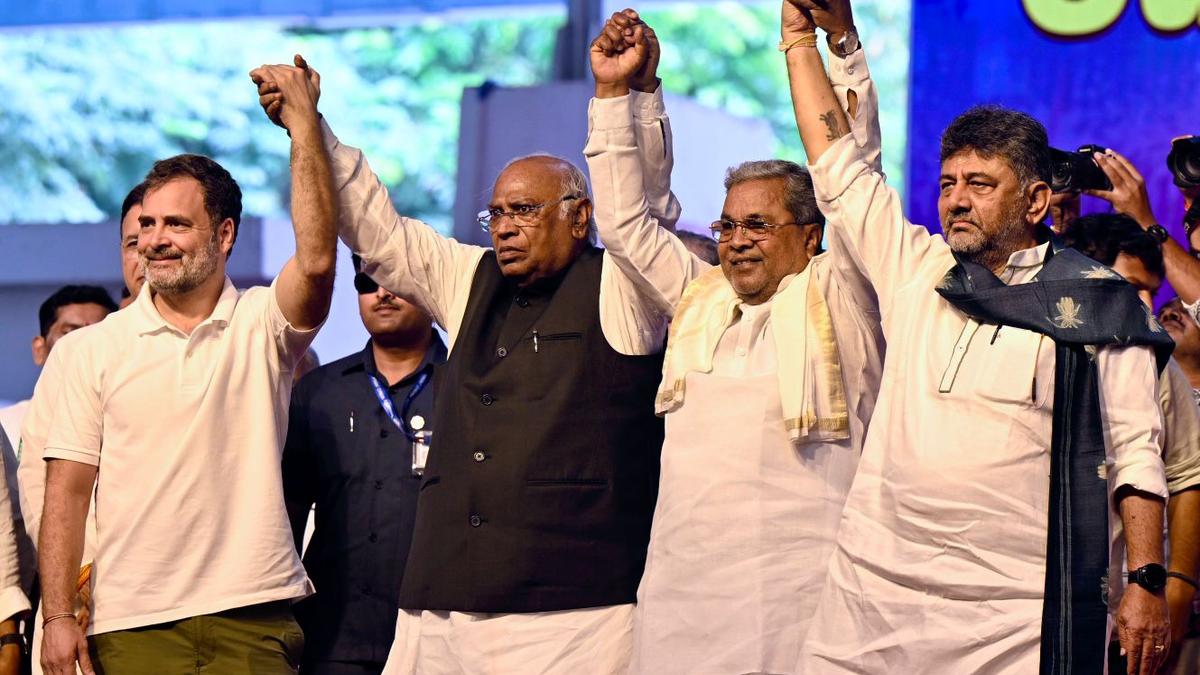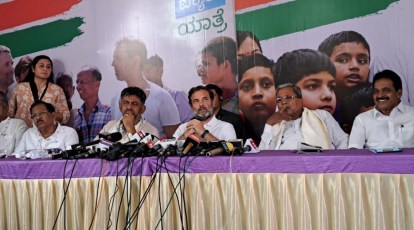In a fiery address at the ‘Vote Adhikar Rally’ in Bengaluru, Congress leader Rahul Gandhi accused the ruling establishment in Karnataka of engaging in large-scale voter data theft. He described the incident as not just a breach of democratic ethics but a “proof of a crime” that undermines the very foundation of electoral integrity. The rally drew massive crowds, with supporters from across the state joining to demand transparency and accountability in the electoral process. Gandhi’s remarks have intensified the political discourse ahead of upcoming elections.
The rally has also triggered deeper scrutiny of electronic voting machines and the systems used to manage voter data. Activists now demand full audits of the machines and a review of the electoral data extraction process itself. While the ECI historically has maintained that EVMs and voter databases are secure, public confidence is eroding. Activists stress that voter trust is foundational to democracy, and any perception of tampering, even if unproven, can cause lasting damage. As a result, faithless rumors now compete with assurance campaigns as authorities race to restore faith in the system.
Social media has exploded with user-generated reports of suspicious voter list entries across multiple wards, not just in Bengaluru. Citizens are comparing lists, pointing out inconsistencies, repeated names, migration-related mismatches, and outdated entries. These crowdsourced findings reflect a public eager to engage—yet anxious about systemic flaws. Ordinary people are now investing their time in whistleblowing, demanding not only accountability but also proactive participation in the electoral process. This groundswell of civic engagement marks a new phase of voter activism in India’s digital age.
Journalists have begun filing Right to Information (RTI) requests to understand the voter data collection process and to seek copies of raw data used during roll revisions. Several local newspapers report encountering red tape, with some public information officers citing “ongoing investigations.” Such resistance adds to the public’s skepticism. A few high-profile RTI applicants are now preparing for appeals to the State Information Commission. The struggle over transparency underscores how data confidentiality and access rights are increasingly becoming battlegrounds in Indian democracy.
Meanwhile, legal experts warn that such high-profile allegations could inspire copycat claims in other states, even if without foundation. Electoral watchdogs caution against the normalization of “crime by rumor” as politics intensifies. Election officials across the country are now bracing for similar accusations, especially in tightly contested regions. While some could be legitimate, many may become political tools, eroding respectful discourse. Civil society groups warn that unless addressed through clear standards and swift action, the entire electoral framework risks politicization and legitimacy loss.


Background
The controversy stems from allegations that private agencies, working with political interests, unlawfully accessed and manipulated voter data during previous elections in Karnataka. These claims have led to widespread outrage among opposition parties, who view this as an attack on democracy. Reports suggest that sensitive personal information of voters was compromised, raising concerns about potential disenfranchisement. The issue has sparked debates across media platforms and civil society, with calls for an independent probe to ensure justice and prevent such incidents in the future.
Stakeholder Views
Congress leaders, while supporting Rahul Gandhi’s stance, demanded immediate action against those involved in the voter data breach. Civil rights organizations have joined the chorus, stressing the importance of safeguarding electoral rolls to maintain public trust in democracy. On the other hand, the ruling party has dismissed the allegations as politically motivated, asserting that the accusations lack concrete evidence. They have accused the opposition of attempting to create unrest and divert attention from their own administrative shortcomings. The Election Commission has so far maintained a cautious stance, stating that it will examine the matter.
Legal/Political Context
India’s electoral laws strictly prohibit the unauthorized access and manipulation of voter databases. If proven, such offenses can result in serious criminal charges under the Representation of the People Act and the Information Technology Act. Rahul Gandhi’s strong statement adds pressure on law enforcement agencies to expedite investigations. Politically, the issue comes at a sensitive time, as Karnataka prepares for local body elections followed by the general elections next year. Any confirmation of voter data tampering could have far-reaching consequences for the credibility of the electoral system.

Public Response
The rally witnessed enthusiastic participation from citizens who expressed anger over the alleged manipulation of voter lists. Many attendees carried placards and chanted slogans calling for “voter justice” and “protection of democracy.” On social media, hashtags related to the rally trended for hours, with users sharing videos, speeches, and personal accounts of alleged voter roll discrepancies. The growing public sentiment suggests that electoral transparency could become a central theme in Karnataka’s political debates in the coming months, influencing voter turnout and party strategies.
Current Status
As of now, the Election Commission has not announced any major investigative breakthrough, though it has hinted at conducting an internal audit of the voter database in Karnataka. Rahul Gandhi and Congress leaders have vowed to continue their agitation until accountability is established. Political analysts believe that the issue could shape campaign narratives, especially if the opposition manages to frame it as a symbol of broader governance failures. Meanwhile, legal petitions on the matter are expected to be filed in the Karnataka High Court in the coming weeks.
Expert Opinions
Political analysts argue that the allegations, if proven, could erode public trust in democratic institutions, especially at a time when faith in electoral processes is already under scrutiny globally. Cybersecurity experts warn that voter data is highly sensitive and, if compromised, can be exploited for targeted disinformation campaigns. They stress the need for robust digital safeguards and stricter monitoring mechanisms. Constitutional scholars have highlighted the importance of swift legal action, cautioning that delays in addressing such breaches could embolden future offenders.
Timeline
The controversy began months ago when irregularities in Karnataka’s voter rolls were reported by several media outlets. Shortly after, opposition leaders claimed they had obtained proof of data theft. Rahul Gandhi’s latest remarks at the Bengaluru rally mark the strongest political attack on the issue to date. The Election Commission’s preliminary response has been limited to statements of intent, with concrete action yet to be seen. With elections drawing closer, the next few months are likely to be decisive in determining whether the allegations lead to legal and political consequences.
Conclusion
Rahul Gandhi’s sharp criticism at the ‘Vote Adhikar Rally’ has amplified concerns over the integrity of India’s electoral process. The alleged voter data theft in Karnataka not only threatens the credibility of upcoming polls but also raises broader questions about the security of democratic institutions in the digital age. The political battle over these allegations is set to intensify, with both sides preparing for a prolonged fight. Whether this issue leads to systemic reforms or remains a flashpoint in electoral politics will depend on the actions taken in the coming weeks.
Technology firms offering election software are also entering the conversation, emphasizing the need for data encryption, secure APIs, and tamper-proof logging systems. Some companies offer blockchain-based solutions to ensure voter roll integrity, claiming real-time verification and auditability. Governments globally are already trialing such systems. Indian stakeholders are now paying attention. Whether Karnataka invokes such innovations for pilot testing remains to be seen—but these developments signal a future where election data protection becomes not just policy talk but technical necessity.
For many rural voters, the conversation feels removed from their realities. They remain concerned with practical execution—polling station management, long lines, ink stamping, and basic awareness. Yet the intense focus on digital data has prompted grassroots volunteers to organize voter outreach sessions, explaining both the new allegations and everyday voting mechanisms. This hybrid model of technological anxiety and civic action illustrates democracy’s dual challenge in India: to manage modern digital threats while maintaining ground-level voter access and confidence.
Political scientists are now evaluating how this episode might recalibrate campaign strategies. Parties may feel compelled to invest more in “voter defense” teams, legal barricades, and data monitoring, alongside their traditional campaign outreach. Electioneering might morph into a courtroom-style battleground, where success no longer depends only on grassroot speeches but on evidence presentation and investigative defense. Such shifts could favor parties with legal resources and tech savvy, potentially widening disparities between well-resourced and grassroots competitors.
Corporate observers watching India’s tech ecosystem are paying attention as well. Some see a nascent market emerging for “Election Tech Security” given India’s scale and democratic complexity. Startups and existing tech companies may now find demand for audit tools, voter verification apps, and tamper alerts. This unexpected political crisis could spark innovation, as democracy and technology collide. If ethical entrepreneurs seize the moment, the incident may seed India’s leadership in election security solutions—though whether that’s optimistic or cynical depends on who you ask.
Ultimately, the Vote Adhikar Rally has ignited a debate that goes beyond Karnataka or Rahul Gandhi’s allegations. It strikes at the core of what democracy demands: transparency, trust, and accountability in every vote cast. Whether this episode results in durable reform—like real-time roll audits, stronger data laws, or civic tech integration—or fades into the usual election noise, the conversation it has begun may well define India’s democratic resilience in an era of data and next-gen threats.
Follow: Karnataka Government
Also read: Home | Channel 6 Network – Latest News, Breaking Updates: Politics, Business, Tech & More

